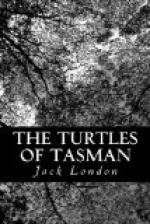What bothered Frederick in Polly was that she attracted him as well as repelled him. His own daughter had never interested him in that way. Mary moved along frictionless grooves, and to forecast her actions was so effortless that it was automatic. But Polly! many-hued, protean-natured, he never knew what she was going to do next.
“Keeps you guessing, eh?” Tom chuckled.
She was irresistible. She had her way with Frederick in ways that in Mary would have been impossible. She took liberties with him, cosened him or hurt him, and compelled always in him a sharp awareness of her existence.
Once, after one of their clashes, she devilled him at the piano, playing a mad damned thing that stirred and irritated him and set his pulse pounding wild and undisciplined fancies in the ordered chamber of his brain. The worst of it was she saw and knew just what she was doing. She was aware before he was, and she made him aware, her face turned to look at him, on her lips a mocking, contemplative smile that was almost a superior sneer. It was this that shocked him into consciousness of the orgy his imagination had been playing him. From the wall above her, the stiff portraits of Isaac and Eliza Travers looked down like reproachful spectres. Infuriated, he left the room. He had never dreamed such potencies resided in music. And then, and he remembered it with shame, he had stolen back outside to listen, and she had known, and once more she had devilled him.
When Mary asked him what he thought of Polly’s playing, an unbidden contrast leaped to his mind. Mary’s music reminded him of church. It was cold and bare as a Methodist meeting house. But Polly’s was like the mad and lawless ceremonial of some heathen temple where incense arose and nautch girls writhed.
“She plays like a foreigner,” he answered, pleased with the success and oppositeness of his evasion.
“She is an artist,” Mary affirmed solemnly. “She is a genius. When does she ever practise? When did she ever practise? You know how I have. My best is like a five-finger exercise compared with the foolishest thing she ripples off. Her music tells me things—oh, things wonderful and unutterable. Mine tells me, ‘one-two-three, one-two-three.’ Oh, it is maddening! I work and work and get nowhere. It is unfair. Why should she be born that way, and not I?”
“Love,” was Frederick’s immediate and secret thought; but before he could dwell upon the conclusion, the unprecedented had happened and Mary was sobbing in a break-down of tears. He would have liked to take her in his arms, after Tom’s fashion, but he did not know how. He tried, and found Mary as unschooled as himself. It resulted only in an embarrassed awkwardness for both of them.
The contrasting of the two girls was inevitable. Like father like daughter. Mary was no more than a pale camp-follower of a gorgeous, conquering general. Frederick’s thrift had been sorely educated in the matter of clothes. He knew just how expensive Mary’s clothes were, yet he could not blind himself to the fact that Polly’s vagabond makeshifts, cheap and apparently haphazard, were always all right and far more successful. Her taste was unerring. Her ways with a shawl were inimitable. With a scarf she performed miracles.




